If you plan on using a vehicle’s third row a lot, let us at least make the suggestion that a minivan would be a smarter bet than anything you’re going to see on this list of best three-row SUVs. Their third rows are bigger, more comfortable and easier to get to. The kids will definitely be happier. Here are our two top choices.
OK, now that that’s out of the way, we totally get why minivans are totally depressing and that if the kids want to be happier, they can buy their own darn vehicle. You’re buying, you’re driving, you’re being seen in it and you’d rather have a three-row SUV. Fair enough. Luckily, there are more choices than ever and they’re really good. The best do a particularly good job of being family friendly without looking like a drab transportation appliance, although really, you can’t go wrong with any of the mainstream three-row SUVs. Now, some of the luxury choices are a bit suspect, including those that are otherwise very appealing but have cramped third-row seats (the Genesis GV80 comes to mind). We’re focusing on three-row SUVs here, so having a usable third row is a must.
In this list, we have broken things down into four sub-categories:
Best Three-Row Crossover | Best Full-size Three-Row SUV
Best Luxury Three-Row SUV | Best Flagship Luxury Three-Row SUV
Note that we define crossovers as SUVs since most buyers use the terms interchangeably, but acknowledge that “crossover” is literally a vehicle with a car-like unibody structure as opposed to the truck-like, body-on-frame construction that traditionally has defined “SUV.” In other words, we consider all crossovers SUVs, but not all SUVs are crossovers (specifically those in the full-size segment and some in the flagship luxury segment).
Best Three-Row Crossover SUV
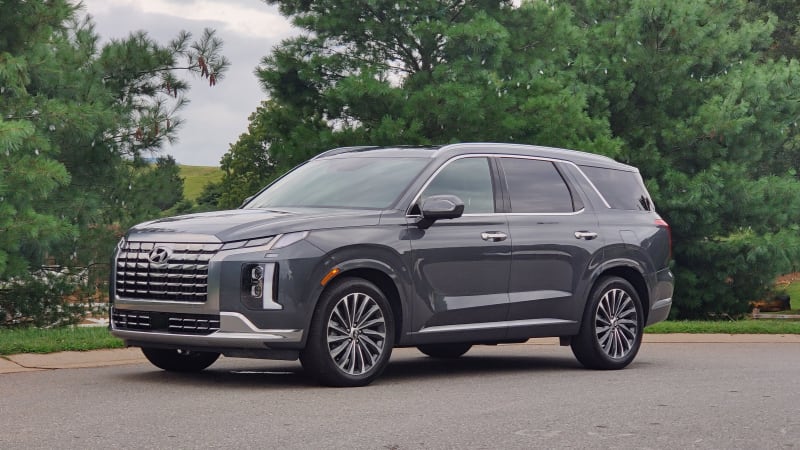
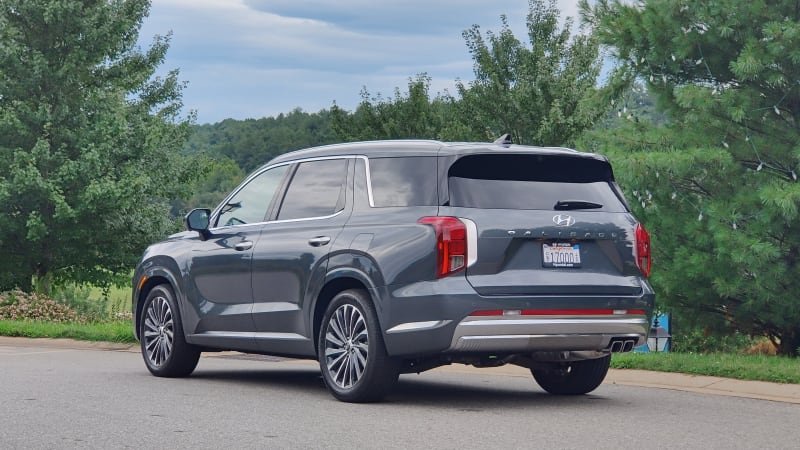
Hyundai Palisade
Why it stands out: More third-row and cargo space; well-executed tech; high-style interior
Could be better: No hybrid or performance version
Read our full 2023 Hyundai Palisade Review and follow updates on our long-term Palisade test
The Hyundai Palisade is mechanically related to the Kia Telluride, and choosing between this pair of masterfully executed family haulers could basically come down to a coin flip. Or, more realistically, which you think looks better. For its part, the Palisade has a more luxurious vibe, which is most obvious in its Limited and Calligraphy trim levels that could easily compete with actual luxury-brand SUVs. The main reason for this is the stylish, well-made cabin that not only looks great, but boasts useful storage, user-friendly infotainment tech and more space than nearly every competitor — bigger kids and even adults will be perfectly comfortable in the third row, and you can fit more stuff behind the raised third row. Hyundai’s driver assistance and safety tech is also among the best-executed in the industry. If there’s a major hole in its game, it’s the lack of a hybrid powertrain or a more powerful version.
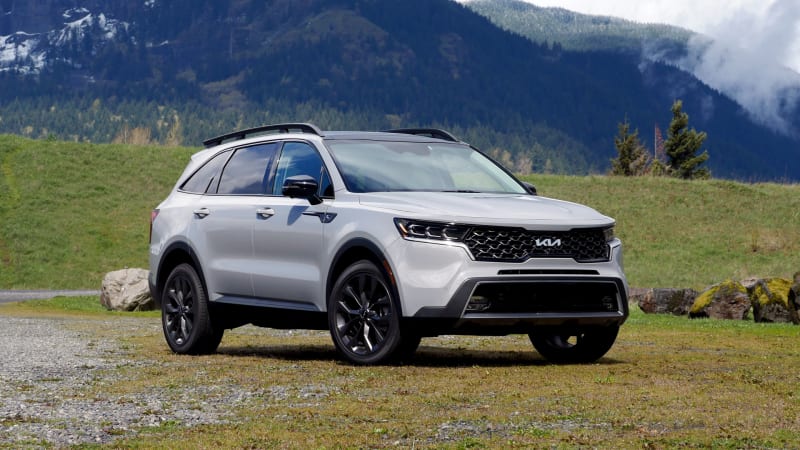
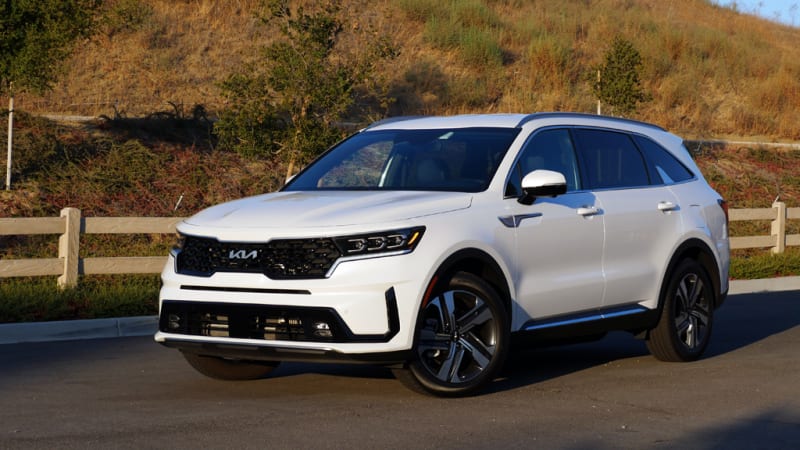
Kia Sorento
Why it stands out: Unique size; efficient engines including two hybrid choices; high-end cabin; well-executed tech
Could be better: Less standard power than similarly priced midsize models; hybrids are extra-hard to come by
Read our full-line Kia Sorento Review or specifically our Sorento PHEV review
The Kia Sorento basically has the exterior dimensions of a two-row midsize SUV, but manages to sandwich in a third row for those who could foresee needing one on occasion, but not frequently enough to warrant driving around a bigger, thirstier and pricier vehicle like Kia’s Telluride. It’s basically for those who don’t necessarily think that bigger is better. And for its part, the Kia Sorento is appealing for myriad other reasons. Completely redesigned for 2021, it features revised styling in keeping with but not copying the successful Telluride. There are even slightly different styling flavors, including the sportier SX Prestige and more rugged X-Line that can now be paired with most trim levels (pictured above left). Inside, material quality is elevated, the design is handsome and technology is not only abundant, but user friendly. The same well-executed driver assistance and safety features that so impress in the Palisade and Telluride are also available in the Sorento. Perhaps most significantly, however, is that the Sorento is one of the very few three-row SUVs offered as a hybrid. Its 37 mpg blows away the V6-powered competition, and there’s an exceptional plug-in hybrid choice (pictured above right) that we’d whole-heartedly recommend except for the extreme difficulty you’ll have in finding one.
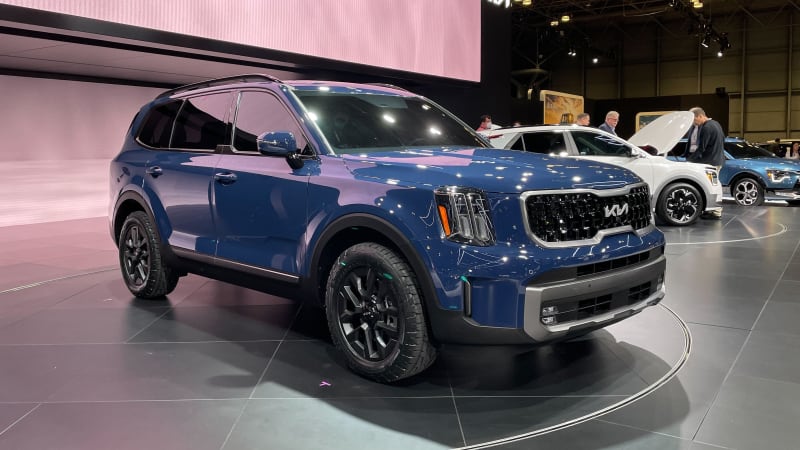
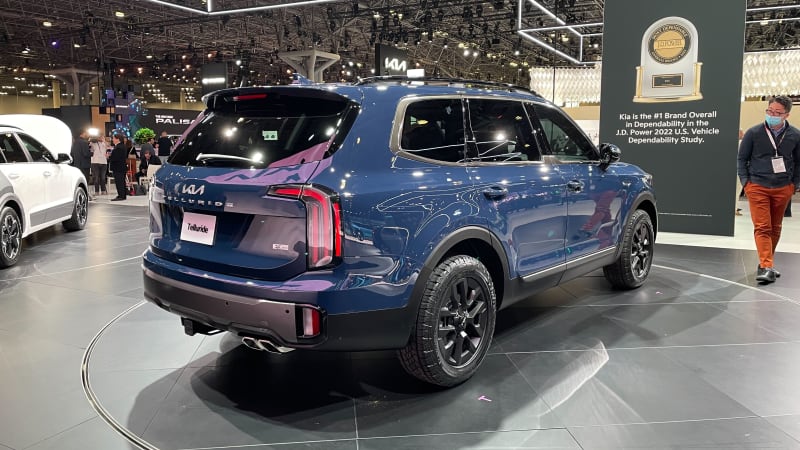
Kia Telluride
Why it stands out: More third-row and cargo space; well-executed tech; well-made interior; doesn’t look like a family hauler
Could be better: No hybrid or performance version available
Read our full Kia Telluride Review
If you’ve already read the above description of the Hyundai Palisade, you’ve already been briefed about its mechanical commonalities with the Telluride and that they share the same fundamental strong points: space, technology, quality and value. They also do so to an extent that outpaces their competitors. Of the two, the Kia Telluride has received the greater share of accolades, largely because its styling seems to resonate with more people. Basically, style is the tie breaker. There’s more than a whiff of Range Rover to its blocky proportions and restrained detailing (although Kia did tart it up a bit for 2023 and removed the Rover-like “Telluride” written across the hood). Basically, the Kia Telluride doesn’t look like a three-row family hauler despite being one of the best three-row family haulers. Win-win.
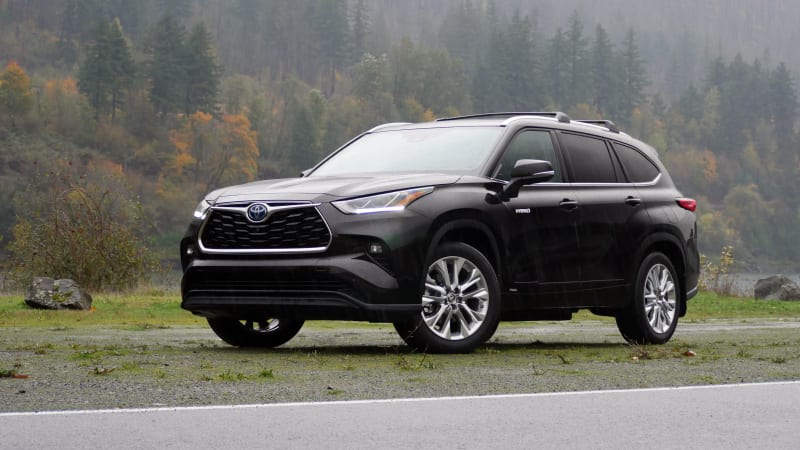
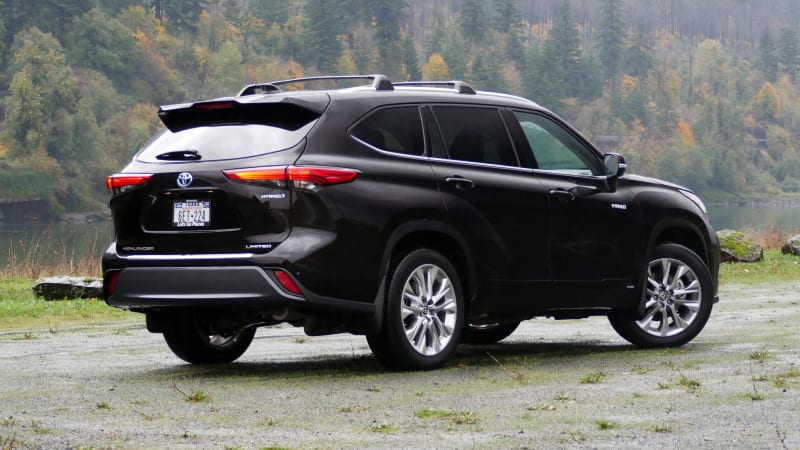
Toyota Highlander Hybrid
Why it stands out: Best fuel economy in its segment by many miles; high-end interior
Could be better: Cramped third-row seat; less cargo space than rivals
Read our full 2023 Toyota Highlander Review
The Telluride and Palisade might be excellent, class-leading three-row crossovers, but their fuel economy is simply average for the segment at 21 mpg combined. The Toyota Highlander Hybrid, on the other hand, gets 35 mpg combined. That difference is as massive as it seems. Besides the environmental benefits, you will save an average of $850 per year at the pump with the Highlander Hybrid, according to the EPA. When you consider it costs only $1,400 more than a comparable V6-powered Highlander, you’re looking at an incredibly quick payback time considering today’s gas prices. True, it has only 243 horsepower, which means it’s on the slow side for the segment and can feel pretty strained if you find yourself doing lots of highway passing, but considering how most people drive their three-row family haulers, we think the 13-mpg advantage will more than make up for that. Besides its fuel economy, though, the recently redesigned Highlander is appealing in its own right with Palisade-rivaling interior quality, composed ride and handling, and ample feature content. If there’s reason for pause, it’s the rather cramped third-row seat that is more comparable to the Sorento’s than the Telluride’s. Clearly then, you have to be willing to sacrifice max three-row space for max fuel economy. We’re guessing many buyers will find that acceptable.
Best Full-Size Three-Row SUV
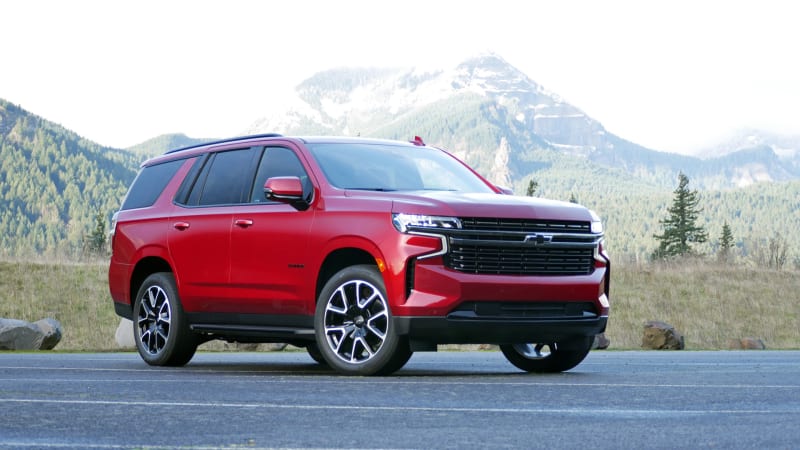
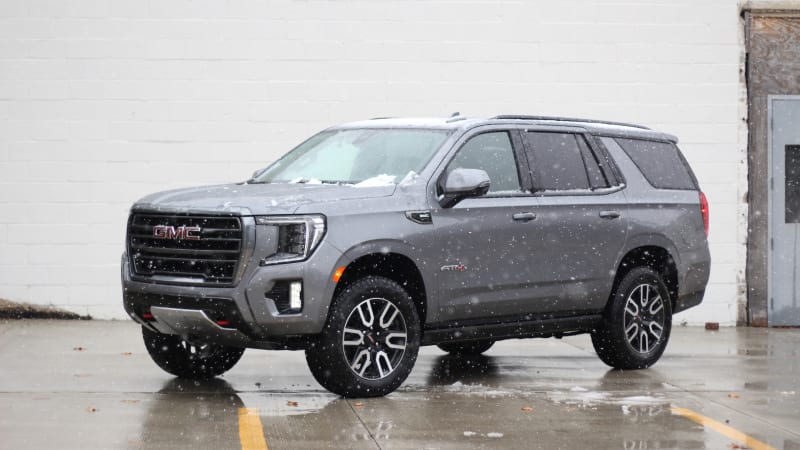
Chevrolet Tahoe/Suburban and GMC Yukon
Why it stands out: Fuel-efficient diesel engine; more third-row space than large crossovers; luxurious interiors
Could be better: Many driver assistance features not available on lower trims
Read our full 2023 Chevrolet Tahoe and Suburban Review and our GMC Yukon Review
The Chevrolet Tahoe and Suburban have long been best-selling full-size SUVs, but those sales didn’t reflect its strength relative competitors. A switch to an independent rear suspension for the all-new generation for 2021 has radically transformed it, however. The third-row in the Tahoe and its GMC Yukon twin go from nearly uninhabitable to one of the biggest in any vehicle. Cargo space has ballooned, including in the extended length Suburban and Yukon XL, and the cargo floor is lower. The ride and handling have also been dramatically improved. Besides the suspension-related improvements, there’s a unique diesel engine option that gets you crossover-like fuel economy, and a fully competitive interior. The GMC Yukon even gets its own interior design for the first time, but it’s exclusive to the Denali trim level. Add it all up, and you get a full-size SUV family that we can now recommend.
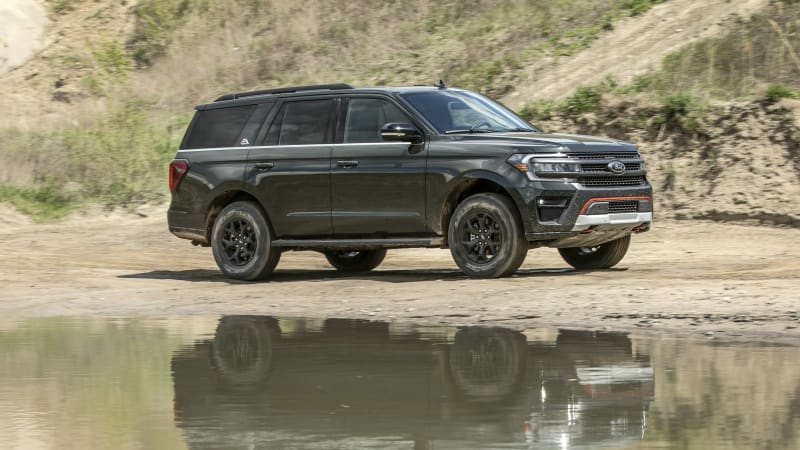
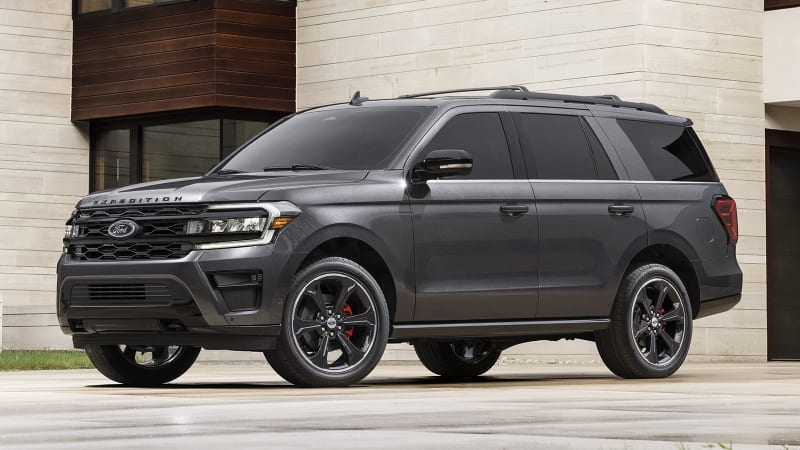
Ford Expedition
Why it stands out: Silky smooth V6 with class-leading torque and fuel economy; bigger third-row than GM SUVs (barely)
Could be better: Less attractive and luxurious interior than Tahoe/Suburban/Yukon
Read our most recent Ford Expedition Review and read about the significant updates made for last year’s Expedition
Until the Tahoe/Yukon were redesigned, recommending the Expedition was an easy choice. Now, the playing field has largely been leveled between the two, with the scales tilting toward the GM SUVs in terms of interior design and quality, infotainment features, and the available diesel engine. While it can’t do much about the latter, at least the Expedition got an updated interior for 2022. Ford also still has the bigger, more comfortable third-row seat, though, plus the piece de resistance: its silky smooth 3.5-liter turbocharged V6 that produces 375 horsepower and 470 pound-feet of torque (and it goes up to 440 hp and 510 lb-ft in the Expedition Timberline pictured above left). Besides that being class-leading torque, it’s horsepower also blows away most competitors, including GM’s 5.3-liter V8 found in most trim levels. Better yet, it’s fuel economy is better than the GM V8s and significantly better than the Jeep Wagoneer’s gas-guzzlers (although those are replaced with a far-more competitive engine in the extended-length Wagoneer L). In other words, just because the Expedition’s been around a while doesn’t mean you should ignore it.
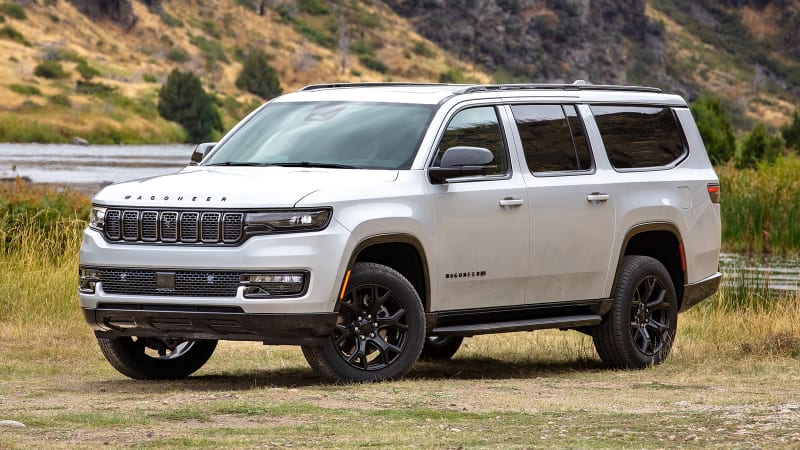
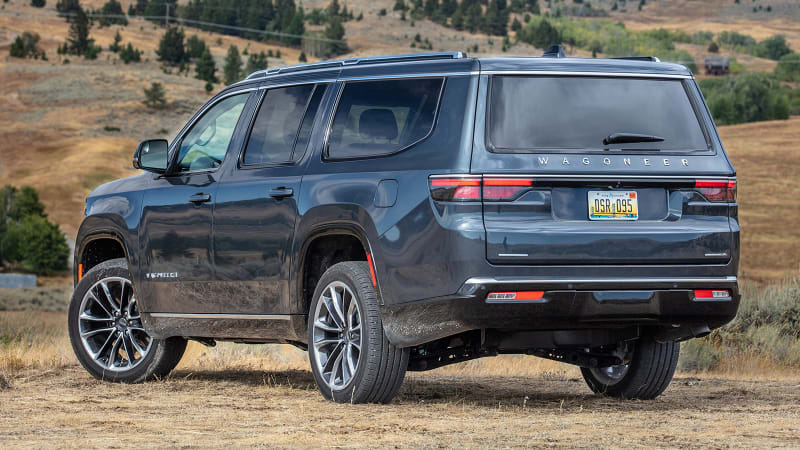
Jeep Wagoneer L
Why it stands out: It’s longer than the Titanic; kidding aside, the interior is just vast; beautiful interior; better engine than regular-length Wagoneers
Could be better: Soft suspension with lots of body motions; good luck parking such an enormous vehicle
Read our review of the Jeep Wagoneer L and Grand Wagoneer L
The letter L makes all the difference here and not for the reason you might assume. The regular-length Wagoneer and ritzier Grand Wagoneer are actually massively spacious in their own right, boasting a bigger third-row seat than its Ford and GM rivals. There’s more cargo space behind that third-row, too. Really, only the most extreme people-and-stuff-hauling needs should require something as vast as a Jeep Wagoneer L, which is a foot longer with 7 extra inches of wheelbase. Instead, the reason we recommend the new-for-2023 Wagoneer L and not its regular-length siblings is what’s under the hood. Rather than the thirsty V8 engines that’ll cost you thousands more on gas per year than a Tahoe or Expedition, the L gets Jeep’s new “Hurricane” turbocharged V6 that produces 28 more horsepower and 64 more pound-feet of torque than the old 5.7-liter Hemi V8 while returning an estimated 20 mpg combined. The gap with the Grand Wagoneer and its 6.4-liter V8 is even greater. Basically, the Wagoneer’s horrible fuel economy kept it from this list in the past. With the new Hurricane, we welcome it aboard … just as long as its the L version.
Best Three-Row Luxury SUVs
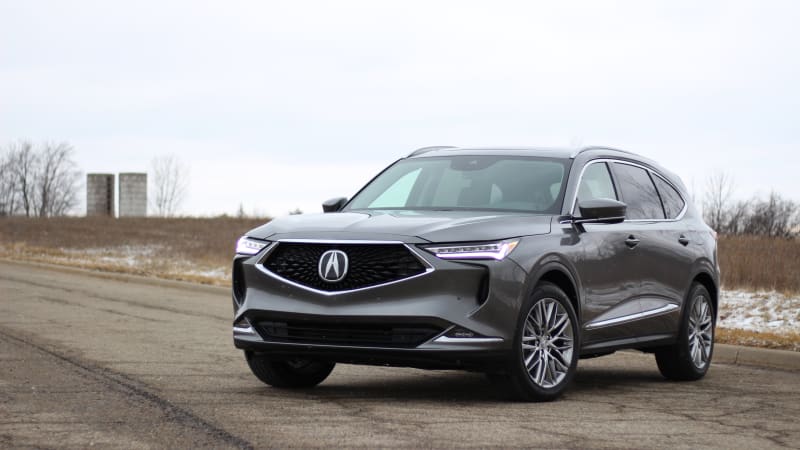
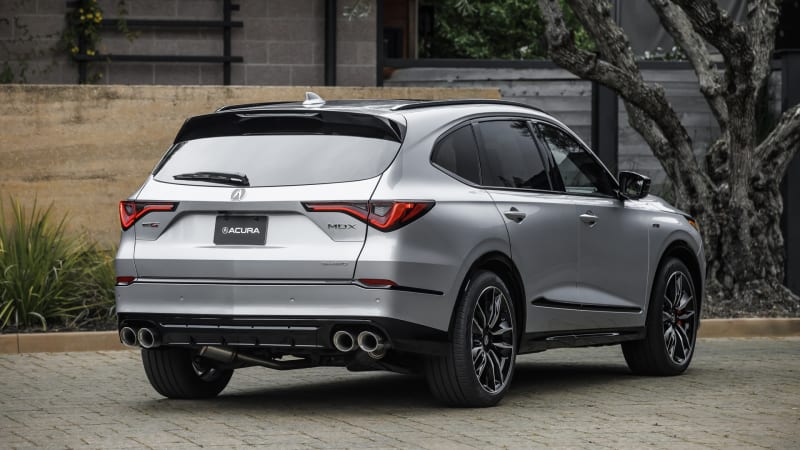
Acura MDX
Why it stands out: Superior handling; versatile second row; value for your money; reliability reputation; sporty Type S
Could be better: Steep tech interface learning curve; stiff brake pedal feel; no plug-in hybrid option
Read our regular Acura MDX Review and our review of the Type S
The MDX was completely redesigned last year. It’s more luxurious than its predecessor, making Acura’s three-row crossover a more convincing competitor for the Audis, BMWs and Lexuses of the world. It also has Acura’s most up-to-date in-car technology, though the interface is an acquired taste. Most important, though, the MDX is not only more engaging to drive than before, it also outpaces its three-row competition — credit to Acura’s latest-generation Super-Handling All-Wheel Drive system as well as an increased focus on driving pleasure. That’s especially true with the Type S (pictured above right). At the same time, though, the MDX remains one of the most sensible luxury SUV choices. The third row is friendlier for teens or adults, and the versatile second row features a removable middle-seat portion, meaning you don’t have to choose between seven-passenger capacity or more comfortable second-row captain’s chairs. There’s also the matter of getting more equipment for your money, as well as the MDX’s traditionally strong resale value and reliability.
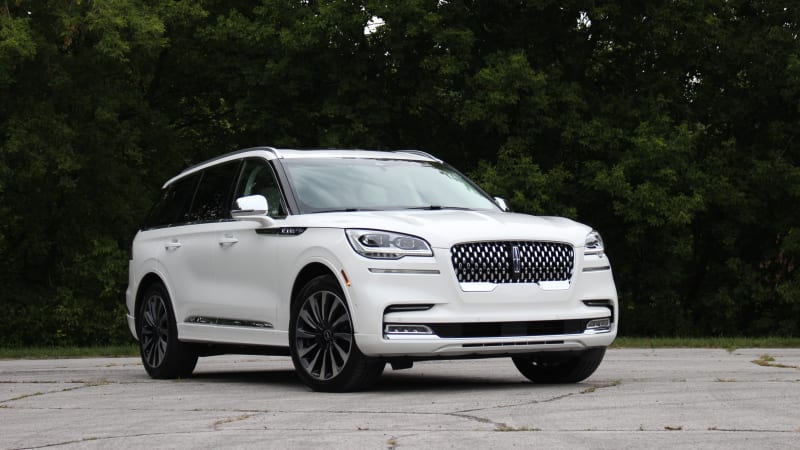
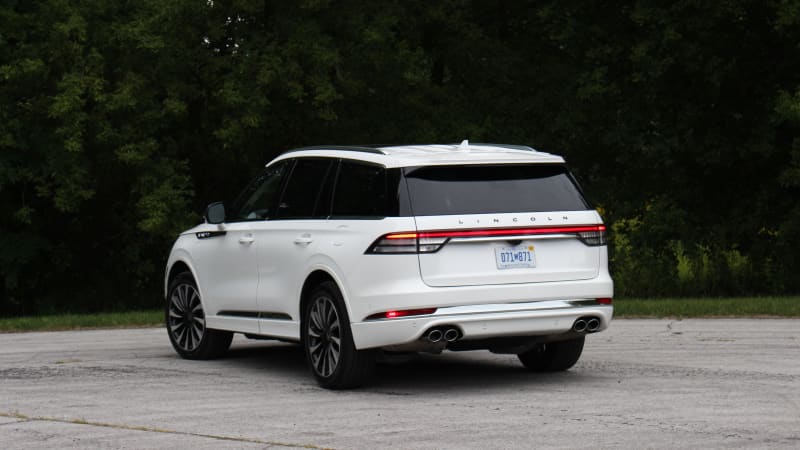
Lincoln Aviator
Why it stands out: High-style cabin; massive power; relatively spacious third-row; ample cargo space
Could be better: A cheaper, less-powerful entry model that would open the Aviator up to more buyers
Read our full Lincoln Aviator Review
You won’t hear us say this very often, but the Lincoln Aviator has too much power. With a standard 400-horsepower turbo V6, the Aviator obliterates the base and upgrade engines of most competitors. That’s definitely commendable, and we’re not really complaining. It’s just that the Aviator is so good, it could easily offer a less robust engine and cater to more buyers with a lower price. They’d still be getting a spacious, well-equipped, easy-to-use and high-style interior, plus a refined driving experience that attempts to make your time behind the wheel “effortless” as opposed to “sporty.” Yes, even with 400 hp, the Aviator is more about grand-touring speed than taking corners (appropriate for a Lincoln). And, speaking of Grand Touring, the Aviator’s trim of that name is in fact a plug-in hybrid that boasts 494 hp and 630 pound-feet of torque. It also has a useful 21 miles of electric range.
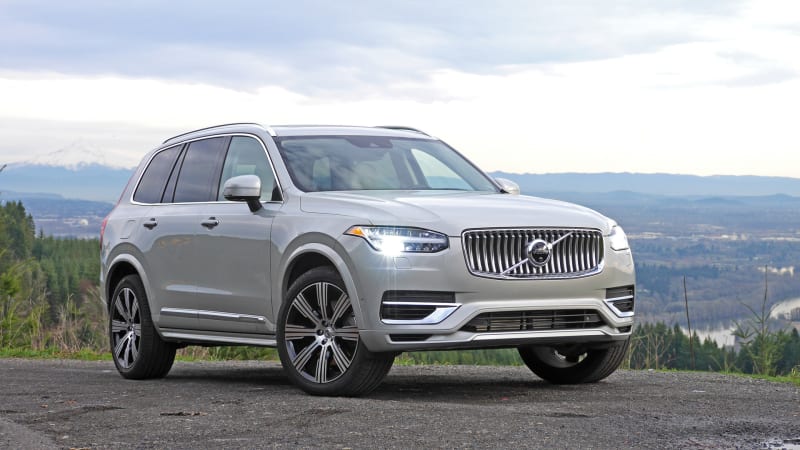
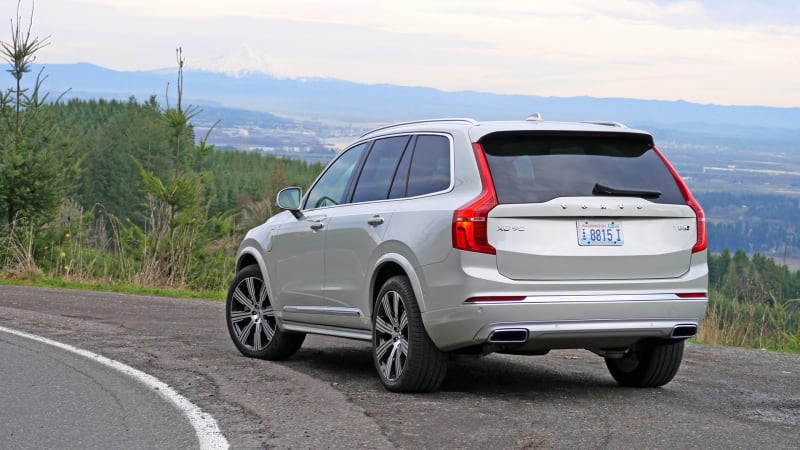 .
.
Volvo XC90
Why it stands out: Spacious third-row and cargo area; Scandinavian design; wide price range; available plug-in hybrid
Could be better: Unrefined engines; tech interface doesn’t agree with everyone; ride can be rough with big wheels
Read our most recent Volvo XC90 Review
You can get an XC90 dressed to the nines with the 455-horsepower XC90 Recharge plug-in hybrid powertrain and every high-tech, leather-lined option available for nearly $85,000 and walk away with a truly special luxury SUV befitting that price tag. At the same time, though, you could get a base XC90 Core for around $58,000 and walk away with a well-equipped and well-made family SUV that’s more spacious, efficient and stylish than most luxury models. Such widespread appeal and competitiveness are rare. The XC90 is a great luxury SUV no matter the price or trim level.
Best Flagship Luxury Three-Row SUV
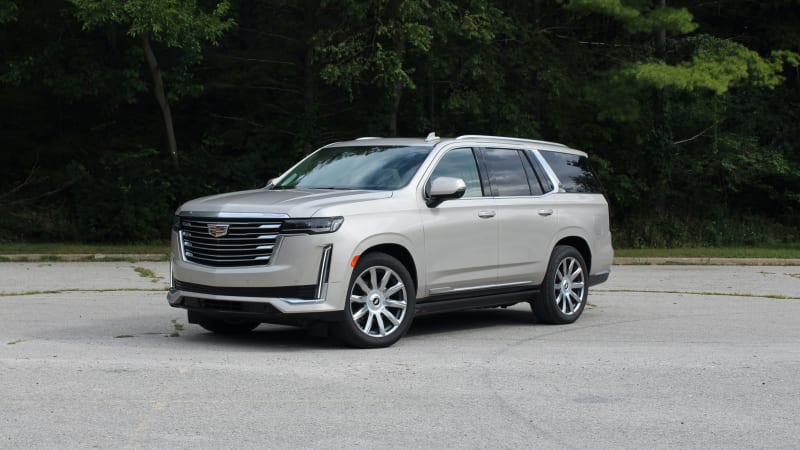
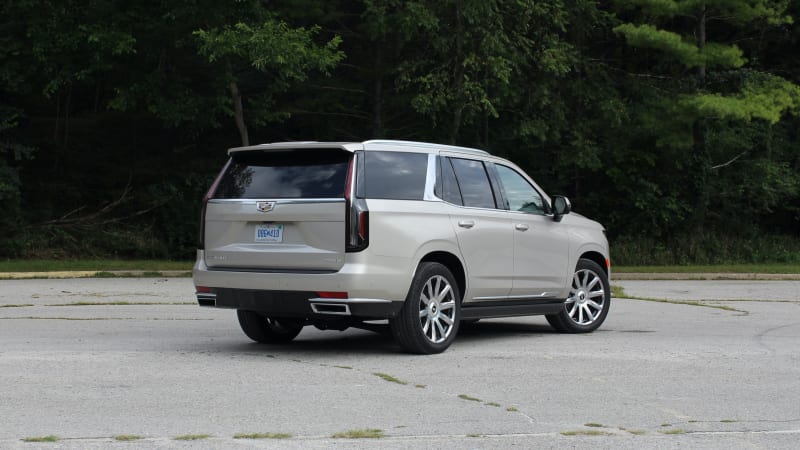
Cadillac Escalade
Why it stands out: 38 inches of OLED screens; diesel engine; tow capability; adult-friendly third row; Super Cruise
Could be better: V8 fuel efficiency; gargantuan size impedes handling and maneuverability
Read our 2023 Cadillac Escalade Review and our specific Escalade Diesel review
The Escalade was all new for 2021, radically improved and far more competitive. The switch to an independent rear suspension took the third row from uninhabitable to one of the biggest on the market, while also benefiting the ride, handling and cargo space. The styling similarly is as refined you’d expect from this lofty price point in terms of materials, design and technology. Specifically, the 38 inches worth of three OLED screens that surround the driver. The Escalade is also available with GM’s highly advanced Super Cruise hands-free driving technology. Another key element is the diesel engine option, which provides the same 460 pound-feet of torque as the standard 6.2-liter gas V8, but should save you significant money at the pump even with high diesel prices. It’s the one to get. On the opposite end of the spectrum, there’s the new Escalade-V, but that’s just a bit too silly to recommend.
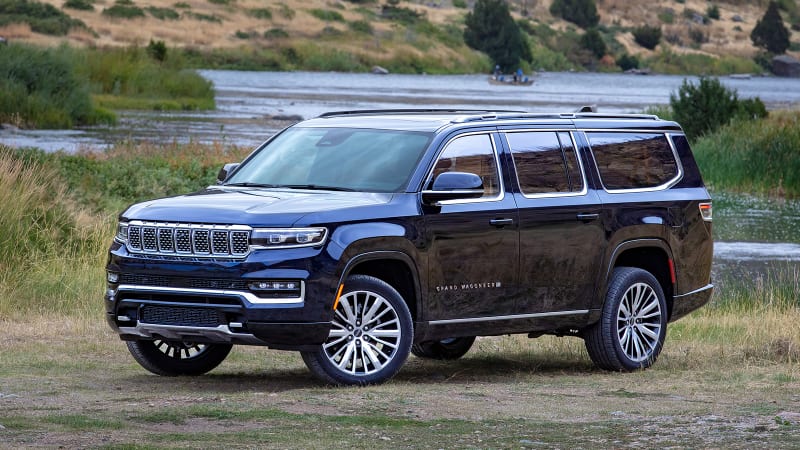
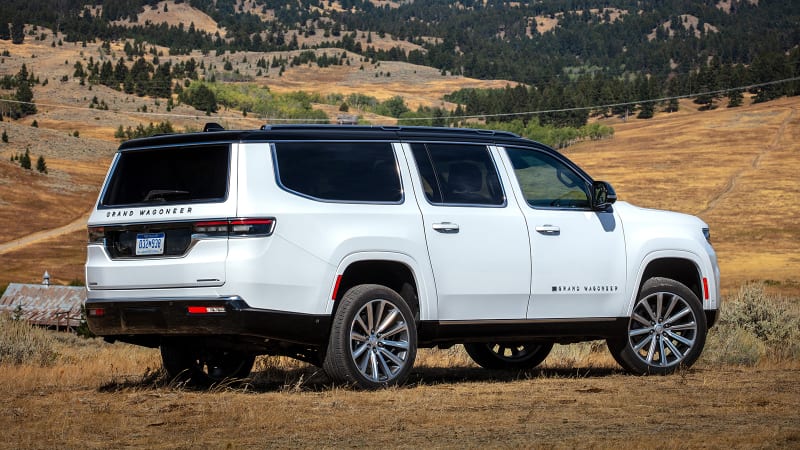
Jeep Grand Wagoneer L
Why it stands out: Beautiful interior; enormous interior space even by segment standards; better engine than regular-length Wagoneers
Could be better: Soft suspension with lots of body motions; good luck parking such an enormous vehicle
Read our review of the Jeep Wagoneer L and Grand Wagoneer L
Just like the non-grand Wagoneer, the letter L makes all the difference here and not for the reason you might assume. The regular-length Grand Wagoneer is actually massively spacious in its own right, boasting a bigger third-row seat than its Lincoln and Cadillac rivals. There’s more cargo space behind that third-row, too. Really, only the most extreme people-and-stuff-hauling needs should require something as vast as a Jeep Grand Wagoneer L, which is a foot longer with 7 extra inches of wheelbase. Instead, the reason we recommend the new-for-2023 Grand Wagoneer L and not its regular-length sibling is what’s under the hood. Rather than the shockingly thirsty 6.4-liter V8 that’ll cost you thousands more on gas per year than a Navigator or Escalade, the L gets Jeep’s new “Hurricane” turbocharged V6 that produces 39 more horsepower and 45 more pound-feet of torque than that old Hemi V8. Basically, the Grand Wagoneer’s horrible fuel economy kept it from this list in the past. The Hurricane changes that, meaning the Grand Wagoneer and its truly luxurious interior can stand more compellingly toe-to-toe with its American luxury rivals.
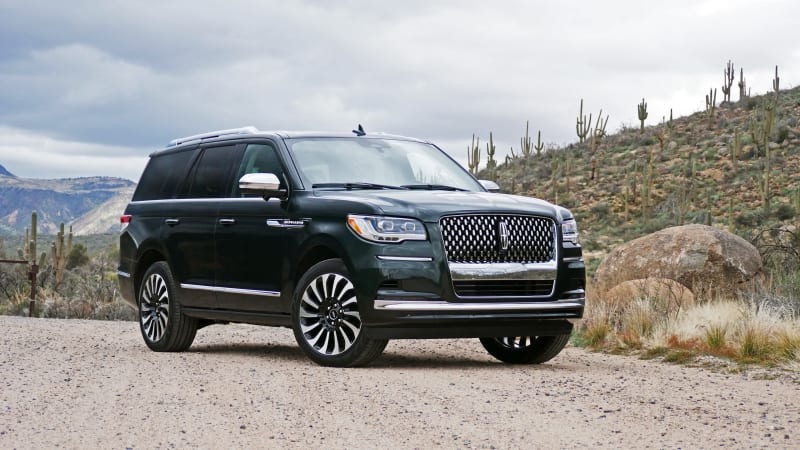
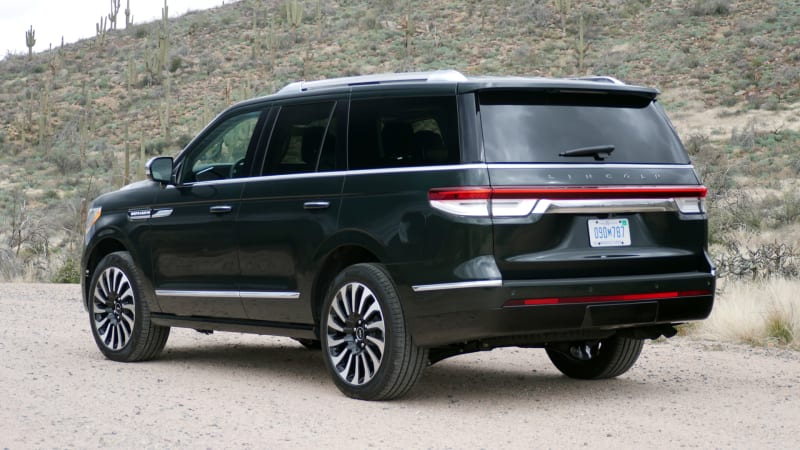
Lincoln Navigator
Why it stands out: High-style cabin; buttery smooth and massively powerful engine; unmatched third-row space
Could be better: Touchscreen seems awfully small thanks to Cadillac; gargantuan size impedes handling and maneuverability
Read our Lincoln Navigator Review
It’s easy to be wowed by the range-topping Navigator Black Label models that can be dressed up in the exquisite color “Themes” of deep green or icy blue. They’re truly special, and if you have the cash, the priciest Navigators are without question the most desirable ones. At the same time, every Navigator benefits from the same general Mid-Century Modern-inspired interior design (updated with a bigger touchscreen for 2022), unmatched passenger space, abundant features list, refined road manners and a standard engine that produces 450 hp and 510 lb-ft of torque. Despite this significant power advantage over the 6.2-liter Escalade, it’s also more efficient (although Lincoln doesn’t offer a fuel-efficient answer to the diesel Escalade). Sure, it’s still gigantic and rather truckish in many regards, but the Navigator can still stand tall against the world’s finest flagship luxury SUVs.
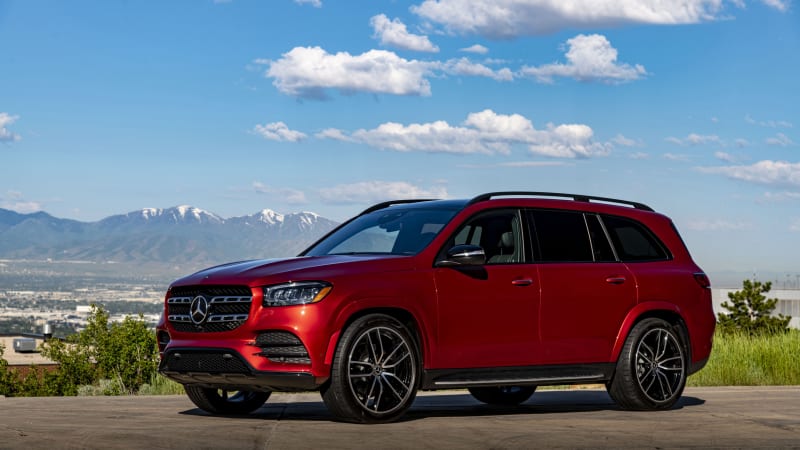
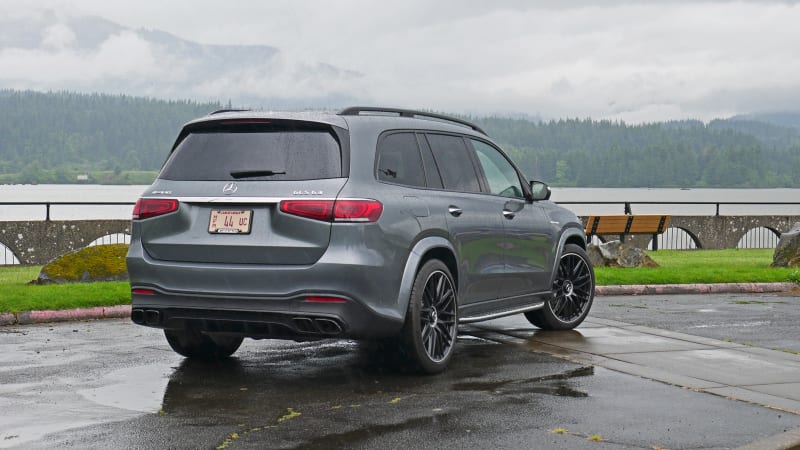
Mercedes-Benz GLS-Class
Why it stands out: Beautiful interior; impeccable engineering oozes from everything; diverse model line; well-executed safety tech
Could be better: Overwhelming and confusing tech interface
Read our most recent Mercedes GLS Review
The Mercedes GLS is so much bigger and so much nicer than three-row luxury SUVs like the Audi Q7 and Volvo XC90 that it’s elevated beyond them into the uppermost echelon of luxury SUVs: the flagships. That it has three rows is in some ways just a bonus for those seeking the most advanced SUV Mercedes has to offer (the Maybach GLS 600 doesn’t even have it), but that aft-most row is also genuinely adult-friendly, which is rare among luxury makers. As such, the GLS can at once compete with the Range Rover and Navigator … not to mention the Bentley Bentayga and Rolls-Royce Cullinan when in Maybach guise. Of course, we think the Maybach and AMG GLS 63 versions are borderline offensive in their overkill and extravagance, but if you want the best, then it’s certainly hard to argue against them.
